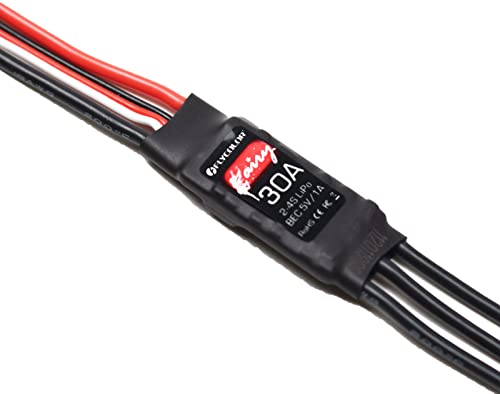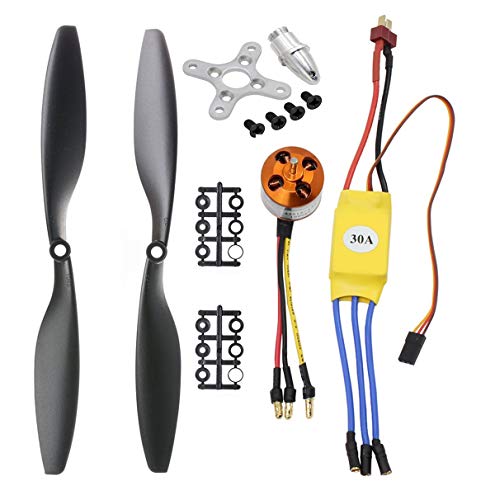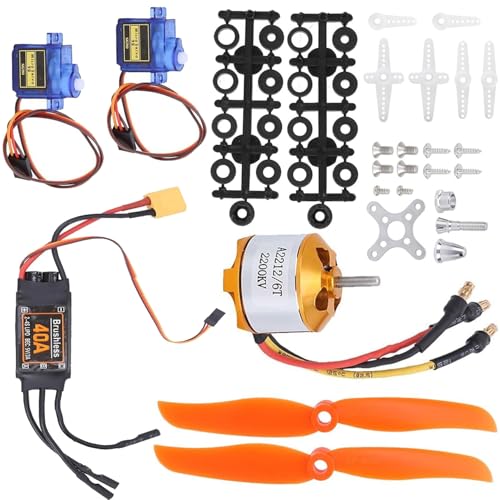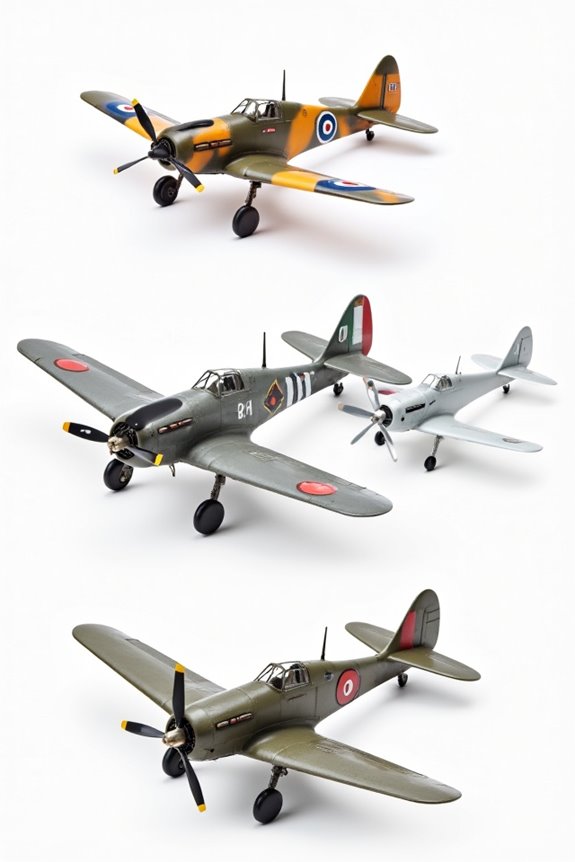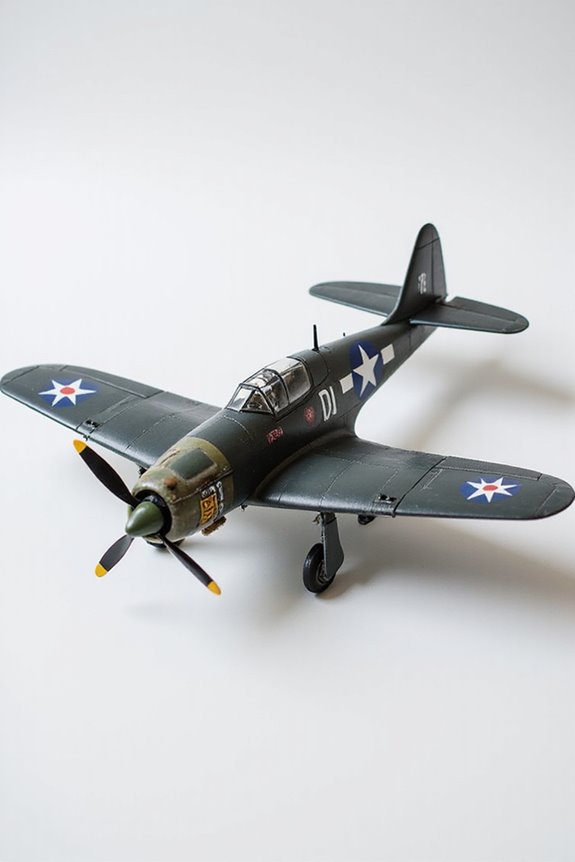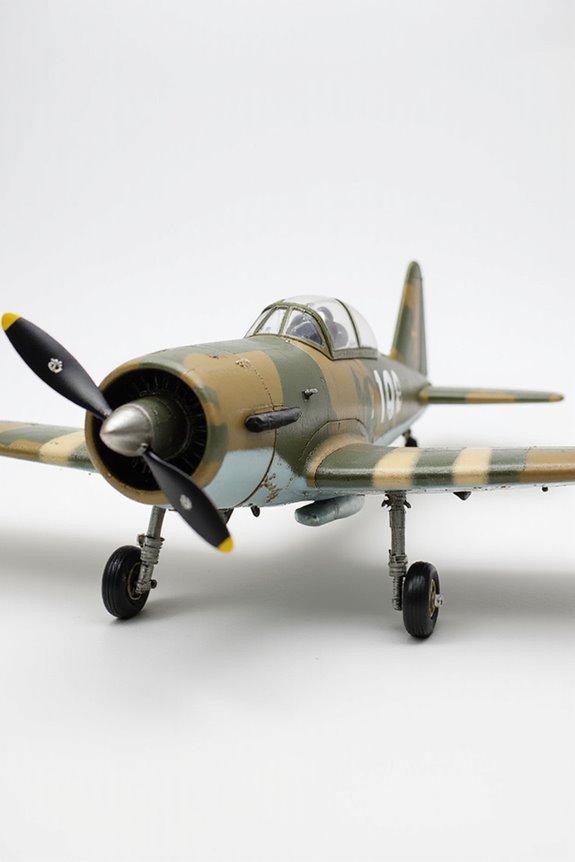As an Amazon Associate, we earn from qualifying purchases. Some links may be affiliate links at no extra cost to you. Although our opinions are based on curated research, we haven't used these products. Articles generated with AI.
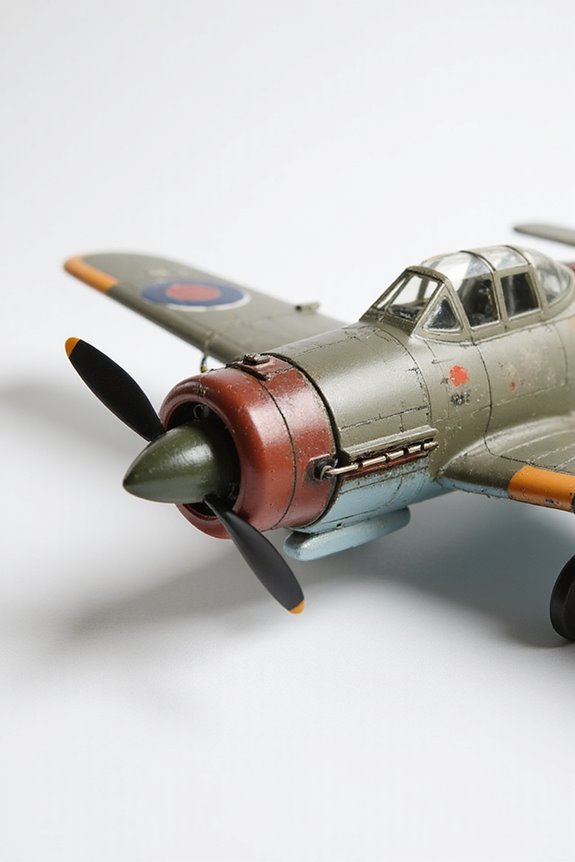
The 5 Best RC Plane Motors and ESCs for Maximum Performance in 2025
If you’re looking to elevate your RC flying game in 2025, check out these top picks! The 30A Brushless ESC is lightweight and super responsive, perfect for efficient flying. Pair it with the abcGoodefg 1000KV Motor Kit, which fits gliders and quadcopters effortlessly. Don’t miss the A2212 1400KV Motor and Propeller Set for beginners. The RC Plane Motor Kit offers impressive lift, while the accessory kit simplifies setup. Stick around for tips on selecting the right motor and ESC!
Key Takeaways
- The abcGoodefg 1000KV motor kit offers versatility, lightweight design, and compatibility with a 30A ESC ideal for various RC aircraft.
- Choose the RC Plane Motor Kit with a KV2200 motor and a 40A ESC for impressive lift and thrust capabilities in larger models.
- Pair larger props with lower KV motors to prevent overheating and ensure efficient flight, especially for acrobatic maneuvers.
- Consider ESCs rated between 20A and 40A to match the motor’s current draw, maximizing flexibility and performance during flight.
- Lightweight ESCs, around 10 grams, help improve maneuverability and flight duration while maintaining balance and stability in the aircraft.
30A Brushless ESC for RC Quadcopter and Airplane
FLYCOLOR 30A Brushless ESC 2-4S with 5V 1A BEC for RC F450 Airplane Durable Quadcopter Helicopter
- Universal Firmware 30A ESC Brushless Speed Controller, super simple. Small size combined with light weight for easy installation.
- Support OneShot 125. High performance MCU. Mini size, lighter in weight. Built-in BEC, high output power, less power loss.
- Multiple protection features: Outstanding blocking protection, protect equipment and personal safety. Abnormal startup protection, over-heat protection, throttle signal...
When you’re diving into the world of RC flying, having the right electronic speed controller (ESC) can make all the difference. Enter the 30A Brushless ESC from Flycolor, perfect for your F450 aircraft. It’s lightweight at just 10 grams, so you won’t weigh down your quadcopter or airplane.
This ESC handles 2-4S LiPo cells, boasting fast throttle response with a specialized firmware designed for multi-rotor applications. Enjoy safety features like overheat protection and low-voltage cut-off—all essential to prevent that heart-stopping moment when things go wrong. With a 4.4 out of 5 rating, it’s a reliable choice. Fly smarter!
Best For: This product is best for hobbyists aged 14 and up seeking a lightweight and reliable ESC for their RC quadcopters and airplanes.
Pros:
- Lightweight design (only 10g) ensures minimal impact on flight performance.
- Fast throttle response and specialized firmware provide optimal performance for multi-rotor applications.
- Multiple safety features (e.g., overheat, low-voltage cut-off) help protect the ESC and connected components.
Cons:
- Some users report challenges accessing the programming menu using the provided instructions.
- Limited compatibility may affect users with certain flight control systems.
- Performance may vary based on the configuration of LiPo cells used.
abcGoodefg 1000KV RC Brushless Motor Kit for RC Plane and Quadcopter
abcGoodefg 1000KV RC Brushless Motor A2212 13T with 30A Brushless ESC 1045 Propeller CW CCW...
- Name: Brushless Motor; Model : A2212-13; KV : 1000RPM/V
- Motor Part Size : 27.5 x 27mm/ 1.08" x 1.06"(L*D); Shaft Size : 3.17mm/ 0.12"
- Fit for Battery : 2-3S Li-Poly, Fit for ESC : 30A
If you’re looking to elevate your RC flying experience, the abcGoodefg 1000KV RC Brushless Motor Kit is a fantastic choice for both newbies and seasoned pilots. This motor packs a punch with a KV rating of 1000 RPM/V, making it perfect for gliders, quadcopters, and helicopters.
Its compact size at 27.5 x 27mm means it fits snugly in various aircraft. You’ll love its battery versatility—compatible with 2-3S Li-Poly batteries and a 30A ESC. Plus, it comes with a 1045 propeller and all mounting accessories. Perfect for smooth skies and thrilling flights, it gets you soaring without a hitch!
Best For: This motor kit is best for both new and experienced RC enthusiasts looking to enhance their flying capabilities in gliders, quadcopters, and helicopters.
Pros:
- Easy installation with included mounting accessories and a compatible 30A ESC.
- Versatile battery compatibility with 2-3S Li-Poly batteries, allowing for greater flexibility.
- Compact design makes it suitable for a variety of aircraft types including planes and multi-copters.
Cons:
- Limited to a maximum of 30A ESC which may not support high-power applications.
- The motor may not be powerful enough for larger or heavier aircraft.
- Requires specific batteries, which may necessitate additional purchases for some users.
abcGoodefg A2212 1400KV RC Motor and Propeller Set
abcGoodefg A2212 1400KV RC Brushless Motor 30A ESC Motor SG90 Micro Servo 8060 Propeller Set for RC...
- A2212 1400kv Brushless Outrunner Motor with connector, 12A/60s, fit for Battery 2-3 Li-Poly.
- 30A ESC BEC output: linear mode: 5V, 2A,Number of battery sections: 2-3S LiPo. With T plug and 3.5mm banana connectors,effectively avoid welding problems.
- SG90 Servo, 4.8V-6V, 0.12 sec / 60 deg (4.8 V).
The abcGoodefg A2212 1400KV RC Motor and Propeller Set shines as an ideal choice for beginners diving into the exciting world of RC flying. This brushless outrunner motor packs a punch, letting you cruise with ease. You’ll get a reliable 30A ESC, sync it up with 2-3S LiPo batteries, and watch your airplane take off.
Don’t forget, it comes with two SG90 servos and a pair of 8060 propellers. Just a heads up though—some users faced issues like vibrations from unbalanced propellers. It’s a solid pick, but a little research is your best friend here!
Best For: Beginners in the RC hobby looking for an affordable and user-friendly motor and propeller set for their projects.
Pros:
- Easy to set up and compatible with various RC aircraft types.
- Includes necessary components such as ESC, servos, and propellers for a complete kit.
- Good value for the price, making it an accessible entry point for hobbyists.
Cons:
- Some components, like ESC and propellers, may lack quality and require replacements.
- Reports of unbalanced propellers causing vibrations that affect performance.
- Limited instructions and support, which can be challenging for novice users.
RC Plane Motor Kit
Chazcool RC Plane Motor Kit, RC Airplane Motor 2212 KV2200 Motor + 40A XT60T ESC + SG90 Servo + 6035...
- MATERIAL: Made of high-quality metal and plastic, easy to install, compatible with lithium-ion battery packs, and can change the time to adapt to different brushless...
- PERFORMANCE: With a smooth surface, wear-resistant, drop resistant, sturdy and durable, compact and exquisite appearance, it is a combination kit that is complete and can...
- COMPATIBILITY: The electronic stability control system can calibrate the throttle range to make it compatible with different transmitters. The micro servo weighs only 9...
Looking to elevate your RC flying experience? The RC Plane Motor Kit is just what you need. It includes a strong 2212 KV2200 motor and a 40A XT60T ESC, ensuring impressive lift and thrust. Plus, the SG90 servo adds precise control, so you won’t end up flying in circles.
Made from high-quality metal and plastic, this kit is built to last. Installation is a breeze—no special skills required! It fits various RC models like gliders and quadcopters, making it versatile. So, whether you fly at home or the airfield, this kit gives you the power and reliability for successful flights every time!
Best For: RC enthusiasts looking for a powerful and reliable motor kit to enhance their flying experience with various aircraft models.
Pros:
- Versatile compatibility: Suitable for multiple RC models, including gliders, quadcopters, and helicopters.
- Ease of installation: Simple setup process that saves time and doesn’t require specialized skills.
- High-quality materials: Constructed from durable metal and plastic for longevity and performance.
Cons:
- Weight limitations: Micro servo may not be suitable for heavier or more advanced aircraft requiring higher torque.
- Requires compatible battery packs: Limited to use with lithium-ion battery packs, which may not be available for all users.
- Basic programming methods: May lack advanced programming options that some experienced users desire.
RC Airplane Motor Accessory Kit
RC Airplane Motor, 2212 KV2200 Brushless Motor 40A XT60T SG90 Servo 6035 Propeller Accessory Kit for...
- Easy to Install: The rc brushless motor installation and use is simple and does not require complicated operations, saving time and effort
- Material: The rc plane kit is made of high-quality metal and plastic, stable performance, durability, and not easy to damage
- Low Noise: The rc airplane motor is small size, low noise, fit for lithium batteries and Ni‑MH batteries, reliable use
For hobbyists who crave versatility in their RC projects, the RC Airplane Motor Accessory Kit is a game-changer. This kit includes a powerful 2212 KV2200 brushless motor and a 40A ESC. With a quick installation process, you won’t need a PhD in engineering to get started. Just plug into channel 3 and power up with a 1s to 3s battery—easy peasy!
Made from high-quality metal and plastic, it’s built to last. You’ll appreciate the low noise while flying, too. Plus, you can adapt it for various RC styles, even for side projects like a mini turret. Let’s get buzzing!
Best For: Hobbyists looking for an easy-to-install, versatile motor accessory kit for their RC aircraft projects.
Pros:
- Easy installation ensures a hassle-free setup for beginners and experienced enthusiasts alike.
- Durable materials provide reliable performance and longevity, reducing the need for frequent replacements.
- Versatile application allows for use in multiple RC styles, including fun side projects like mini turrets.
Cons:
- Limited to specific batteries (1s to 3s), which may not cater to all users’ preferences.
- Requires additional components like a transmitter and battery, which could increase overall costs.
- Noise levels, while low, may still be noticeable in quiet environments, potentially affecting stealthy operations.
Factors to Consider When Choosing an Rc Plane Motor and Esc
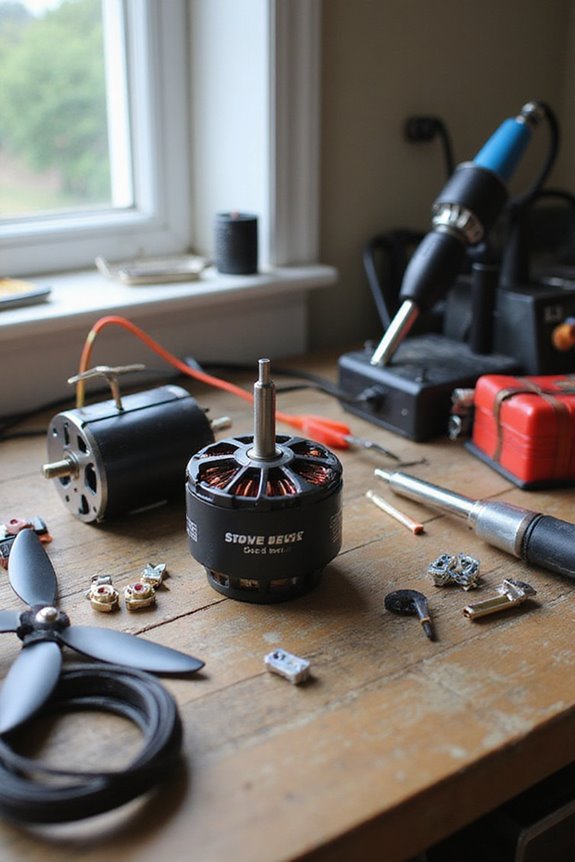
When you’re picking out an RC plane motor and ESC, there are several crucial factors to keep in mind. First off, consider the motor’s Kv rating—it’s like the horsepower of your aircraft. You’ll also want to confirm your ESC’s amperage capacity matches your setup, along with compatibility with your battery, propeller size, and how tricky the installation might be—nobody wants a puzzle right before takeoff!
Motor Kv Rating
Understanding motor KV ratings is key to maximizing your RC plane’s performance. The KV rating tells you how many RPMs a motor spins per volt. A higher KV means faster speeds—think of it like your plane’s caffeine boost! But, watch out: higher KV motors can lack torque, which might not be ideal for bigger props.
For most RC planes, KV ratings typically range from 1000 to 2200 RPM/V. When you’re picking a motor, match the KV rating to your plane’s purpose. Smaller props and speed crave those higher KV motors, while larger props appreciate lower KV options. Don’t forget, pairing the right ESC is essential, especially for those high-KV motors craving more juice during flight!
ESC Amperage Capacity
Choosing the right ESC amperage capacity is essential if you want your RC plane to soar without a hitch. Think of it like picking a power outlet for your fridge; you need to match the load! Your ESC should match or exceed the motor’s current draw to prevent any overheating drama. For most setups, an ESC rated between 20A and 40A does the trick, depending on size.
Keep an eye on your motor’s specs, like the KV rating and expected use, to find a compatible ESC. Plus, a higher amperage rating gives you more wiggle room for those heart-pounding maneuvers. Remember, operating at max capacity isn’t a race—it’s a recipe for early failure!
Battery Compatibility Options
Selecting the right battery for your RC plane isn’t just a formality; it’s a game changer! You’ll want to match your motor with LiPo batteries rated between 2-4S for peak performance. Don’t forget about the Electronic Speed Controller (ESC); it must handle the same voltage range as your battery.
Different KV ratings, like 1000KV or 1400KV, might require unique battery setups to hit the sweet spot for RPM. Always check the motor and ESC specs for maximum input voltage—no one needs a smoky surprise mid-flight!
Weight matters too; a higher capacity battery can mean longer flights but also heftier planes. Balance is key, or you might just be flying a lead balloon!
Installation Complexity Level
When diving into the world of RC planes, installation complexity can be a bit of a puzzle. Some motor and ESC kits offer a plug-and-play design, making setup as easy as pie. This is especially handy for beginners who want to fly without turning into a full-blown engineer.
However, not all kits are created equal. Some require intricate configurations and may leave you scratching your head. Always check if your chosen products come with clear instructions and mounting accessories. Without them, you might feel like you’re trying to assemble IKEA furniture without a manual. Finally, consider compatibility with battery types and programming methods, as that can add layers of complexity to your setup. Keep it simple, and get ready to soar!
Propeller Size Compatibility
Finding the right propeller size is like picking the perfect pair of shoes for your RC plane; get it wrong, and your craft might struggle to take off. A prop’s size needs to mesh well with the motor’s KV rating. Larger props usually require lower KV motors to avoid overheating. You also need to take into account your ESC’s current rating; too much draw from the prop could fry it faster than an egg on the pavement!
Typical prop sizes range from 6 to 10 inches. Match the prop size to your flying style—acrobatics need quick thrust, while gliders prioritize efficiency. Don’t forget about torque! Insufficient torque affects thrust and performance. Get it right, and you’ll soar smoothly!
Weight Considerations for Crafts
Weight plays an essential role in the performance of your RC plane. An overweight craft can turn your soaring dreams into a lead balloon! Motor and ESC weight matters, and a lightweight motor, like the 1000KV or 1400KV brushless types, enhances maneuverability and flight times. Just think of it as your plane going on a diet!
Don’t forget the ESC! It typically ranges from 10 grams for a 30A ESC to heftier options; you need to keep it within your aircraft’s weight limits. Plus, balance is key—if your motor or ESC is too heavy in one spot, your plane might wobble like you’re trying to dance on a tightrope! Match the total weight with your aircraft and battery capacity for the best results.
Frequently Asked Questions
What Tools Are Needed for Installing RC Plane Motors?
You don’t need a magic wand, but a few handy tools will do! To install RC plane motors, grab a screwdriver set, a hex wrench for securing mount screws, and pliers for wire connections. You’ll also want soldering gear to make solid connections and heat shrink for insulation. A good prop tool can help you adjust the propeller easily. With these tools, you’re ready to soar, not just cruise!
How Do I Troubleshoot a Malfunctioning ESC?
When your ESC’s acting up, don’t panic! First, double-check your connections to verify they’re secure. Loose wires can play tricks on you. Next, try recalibrating it; this often fixes issues. If that doesn’t work, listen for unusual beeping sounds—those tell you something’s off. Finally, consider compatibility; an incompatible ESC can lead to trouble. Think of it as a bad date—sometimes, it just doesn’t click! Keep your setups in line, and you’ll fly smooth.
Can I Use a Car ESC in My RC Plane?
Sure, you can use a car ESC in your RC plane, but it might not be the best fit. Car ESCs are designed for high torque and fast acceleration on the ground. In the air, your plane needs smoother throttle control and precise response. It’s like trying to run a marathon in roller skates—possible, but not ideal! Always check the specs for compatibility with your motor and battery to avoid a mid-air meltdown.
What Are the Signs of Motor Wear in RC Planes?
You’ll spot motor wear in your RC plane by listening for unusual noises, like grinding or rattling. A decrease in power during climbs is another big red flag. If you notice excessive vibrations or your motor’s heating up more than usual, it’s time to investigate. Just like a tired puppy, a worn-out motor won’t perform its best, so keep an eye out for these signs to guarantee smooth flights!
How Do Battery Types Affect Motor Performance?
Battery types play a huge role in your RC plane’s motor performance. LiPo batteries deliver high current, giving your motor that much-needed kick. You’ll notice faster speeds and quicker climbs. On the other hand, NiMH batteries can’t keep up; they provide steadier power but lower output. Think of it this way: using LiPo is like fueling a race car, while NiMH is more like a steady jog. Choose wisely for maximum fun!

